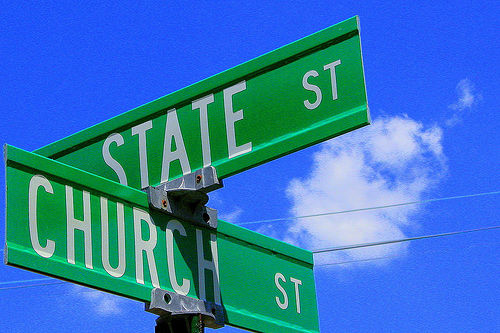
Is it time to end the division between church and state in the United States? On today’s Huffington Post, blogger Matthew Anderson, a writer and commentator, makes the case for the blending of church and state. While many might bristle at the idea of ending the constitutional separation of church and state, Anderson suggests that if religion were taught in public schools it would foster an atmosphere of tolerance and understanding. Anderson’s plan would involve a required religion class, taught every year from junior high through the twelfth grade. Classes would go well beyond blending church and state, the six-year religious education would bridge the gap between synagogue, dharma center, mosque, synagogue, and temple. From Anderson’s post:
I believe that it might be instructive for Americans to combine [church and state] by creating a series of religious classes taught in every school between the seventh and twelfth grades. Two classes per semester in addition to other ancillary academic courses would be required. One requirement would be that those responsible for teaching a certain discipline could not belong to that belief. Christians could not teach Christianity and Jews could not teach Judaism. But then, some of the best instruction would be left lacking if the experts in those religions were kept from instruction, you say? Well maybe, but the rudiments of religions could be taught quite effectively by those with no dog in the fight. The Bible, the Torah, the Koran, the Bhagavad Gita and even the teachings of Bodhidharma and the Buddha would be required along with other religions. Though Buddhism can hardly be called a religion (of the more than one million words attributed to Buddha, never was God mentioned once in his teachings), we would include it in our instruction because so many Americans mistakenly believe it to be a source of religious belief. Indeed, as this philosophy was being taught, perhaps those Americans who only read their Bibles might learn more so as to be informed in conversation. It serves the Christian God no purpose to have followers who know not what they follow. However, it does serve those who would take advantage of such raw ignorance. Education trumps ignorance, or so it is believed.
Anderson does not shy away from the dangers of bridging church and state—he fears that a new level of understanding might eventually cause people to move away from a secular system and towards “the global and cosmic.” But ultimately Anderson sees potential in a systematic religious education and believes that religious discourse would help to isolate religious extremist and allow the “strong voice of religious fervor resound in the classroom and not on the battlefield where it’s message is prima facie too late.” What do you think of Anderson’s suggestion? Read the full article here.
Thank you for subscribing to Tricycle! As a nonprofit, we depend on readers like you to keep Buddhist teachings and practices widely available.